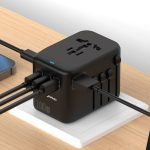When the FBI searched former President Donald Trump’s home at his Palm Beach resort last month, it was investigating possible violations of three federal statutes. None of those crimes hinges on the question of whether the documents that the FBI found at Mar-a-Lago, more than 100 of which were marked as classified, still had that status. That issue nevertheless has become a major point of contention between Trump and the Justice Department as they wrangle over what should be done with the 11,000 or so records seized by the FBI.
Trump’s lawyers say the government has failed to prove any of the documents were still classified, while the government’s lawyers say Trump has presented no evidence to the contrary. U.S. District Judge Raymond Dearie, the “special master” appointed to review the records, yesterday endorsed the government’s take on that issue. Dearie, who served seven years on the Foreign Intelligence Surveillance Court, suggested he had no business second-guessing classification markings. “As far as I’m concerned, that’s the end of it,” he said during a hearing in Brooklyn, unless Trump can present evidence that he declassified the records when he still had the authority to do so.
Trump attorney James Trusty implied that such evidence exists, but he said disclosing it would be premature. “We are not in a position, nor should we be in a position at this juncture, to fully disclose a substantive defense,” Trusty said. “We shouldn’t have to be in a position to have to disclose declarations and witness statements.” Dearie was not buying it. “My view of it is you can’t have your cake and eat it,” he replied.
All of this is rather surreal in light of the precautions that everyone, with the possible exception of Trump himself, seems to think are appropriate in handling the records marked as classified. Trusty, who already has a top-secret security clearance thanks to work on a prior case, told Dearie he was seeking expedited clearances for his colleagues so they also could have access to the documents. The New York Times reports that Julie Edelstein, a Justice Department lawyer, said “a handful of the documents at issue were so secret that even Mr. Trusty’s clearance might not be enough.” She added that “some of the documents are so sensitive that members of the team investigating possible offenses here have not yet been able to see them.”
Even Dearie, despite his extensive work as a judge who routinely dealt with classified information, said he would prefer to resolve the dispute without reading the sensitive documents. “It’s not just a matter of having the clearance,” he said. “It’s a matter of need to know.”
If you believe Trump and trust his judgment, all these safeguards are unnecessary, because he decided the records were not sensitive enough to justify keeping them classified. Trump claims he had “a standing order” as president that automatically declassified any documents he removed from the Oval Office to study at his residence in the White House. “The very fact that these documents were present at Mar-a-Lago,” he said four days after the FBI’s search, “means they couldn’t have been classified.”
The policy that Trump described was news to national security officials who should have known about it. William Barr, Trump’s former attorney general, thinks it is “highly improbable” that Trump ever issued such an order, which “would be such an abuse and show such recklessness that it’s almost worse than taking the documents.”
Trump’s lawyers notably have not repeated his “standing order” claim in court. But they told U.S. District Judge Aileen Cannon, who appointed Dearie at Trump’s request last week, that she should not accept the presumption that documents marked as classified are in fact classified. “The Government has not proven these records remain classified,” Trusty et al. said last week. “That issue is to be determined later.”
Trump’s attorneys were responding to the government’s request for a partial stay that would have allowed the FBI to continue using those documents for its criminal investigation while Dearie reviews the rest to determine which might qualify as personal property, attorney-client communications, or material covered by executive privilege. After Cannon rejected that motion, the Justice Department asked the U.S. Court of Appeals for the 11th Circuit to intervene.
In a motion filed last Friday, the government’s lawyers argue that the reasons for having Dearie review the documents do not apply to the records marked as classified, which bore labels ranging from “confidential” to “top secret” and included “sensitive compartmented information” about intelligence sources and methods. “The markings establish on the face of the documents that they are not Plaintiff’s personal property,” the motion says, “and neither Plaintiff nor the court has suggested that they might be subject to attorney-client privilege. Plaintiff has never even attempted to make or substantiate any assertion of executive privilege.”
The Justice Department also notes that Trump’s lawyers have not embraced his declassification claim. “Plaintiff has never disputed that the government’s search recovered records bearing classification markings,” it says. “Instead, the district court cited portions of Plaintiff’s filings in which he suggested that he could have declassified those documents or purported to designate them as ‘personal’ records under the [Presidential Records Act] before leaving office. But despite multiple opportunities, Plaintiff has never represented that he in fact took either of those steps—much less supported such a representation with competent evidence.”
In response, Trump’s lawyers reiterated their argument that the documents’ classification status remains a matter of dispute. “The Government again presupposes that the documents it claims are classified are, in fact, classified and their segregation is inviolable,” Trusty and Christopher Kise, another Trump lawyer, write in a brief they filed with the 11th Circuit yesterday. “However, the Government has not yet proven this critical fact.”
As Dearie sees it, the burden of proof at this stage of the case, which involves civil litigation over which documents the government can keep and how they can be used, is on Trump, not the government. If the Justice Department ultimately decides to prosecute Trump, of course, it will have the burden of proving his guilt beyond a reasonable doubt. But that won’t necessarily involve rebutting Trump’s claim that he declassified everything he took.
At yesterday’s hearing, Trusty implied that “declarations and witness statements” concerning declassification of the purloined documents would be part of Trump’s “substantive defense” in a criminal case. How so? “The Government apparently contends that President Trump, who had full authority to declassify documents, ‘willfully’ retained classified information in violation of the law,” Trusty and Kise write, citing 18 USC 793(e). But that provision, which is one of the laws cited in the FBI’s search warrant, does not mention classification, referring instead to “defense information” that “could be used to the injury of the United States or to the advantage of any foreign nation.”
In principle, that description could apply to sensitive documents even if Trump actually declassified them, especially if he did so as recklessly as his description suggests. The relevance of the two other statutes that the FBI mentioned, which deal with improper retention of government documents (classified or not) and obstruction of justice, likewise does not depend on whether anyone believes Trump’s story about “a standing order.”
The post Judge Reviewing Mar-a-Lago Documents Complains That Trump Has Offered No Evidence He Declassified Them appeared first on Reason.com.







